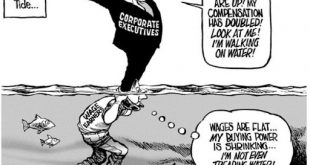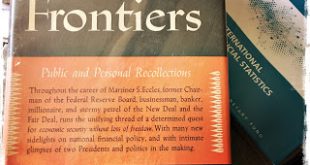New issue of ROKE with papers by Stephen Marglin, Amit Bhaduri, Esteban Pérez (with your truly) among others. Last issue of the several in honor of the 25 years of the Marglin-Bhaduri papers on profit-led/wag-led growth. From the abstract of Marglin's paper: The central question this paper addresses is the same one I explored in my joint work with Amit Bhaduri 25 years ago: under what circumstances are high wages good for employment? I extend our 1990 argument in three directions....
Read More »Beggar thy Neighbor economic development at the Rick Smith Show
On Rick's show last Friday. Some context here. [embedded content]
Read More »On Ecuador
The original letter I co-signed is here, and the debate that followed was posted by Bill Black here.
Read More »The new Marriner S. Eccles Institute, and his legacy
There are many issues I take exception with the piece at the Deseret News on the new Marriner S. Eccles Marriner S. Eccles Institute for Economics and Quantitative Analysis at the University of Utah’s David Eccles School of Business. In the first place, the notion that it, somehow, “will provide some philosophical balance to the university’s educational offerings and scholarship on economics.” Not just because there is no need for more balance. Everybody in the David Eccles School is...
Read More »Heterodox Currents in Latin America
Esteban Pérez Caldentey will be talking about the topic in the next conference of the central bank of Bolivia. Program, that includes also Luis Bértola speaking on heterodox (presumably the unconventional, but not heterodox as in not mainstream inspired) monetary policy, is available here.
Read More »Beyond the traditional monetary circuit
Slow posting will continue the rest of the Summer. Here a paper by Sergio Cesaratto that might be of interest. From the abstract: The paper is a contribution to a long-run theory of effective demand with elements from monetary circuit theory, Modern Monetary Theory and endogenous finance analysis. Some shortcomings of the still influential neo-Kaleckian growth model and monetary circuit theory are underlined, and the Sraffian supermultiplier is indicated as the most promising heterodox...
Read More »From Vulture Funds to 100-year bonds: Has Argentina Turned Around?
Just a couple of years ago Argentina’s left of center government was besieged by foreign investors, the hedge funds known as Vulture Funds, that demanded full payment for their bonds acquired at heavily discounted prices in the secondary markets. The New York courts ruled in favor of the Vulture Funds, and Argentina was unable to borrow in international markets, even though during the successive governments of the late Néstor Kirchner and her wife Cristina Fernández de Kirchner the country...
Read More »A theory of economic policy
New paper by Thomas Palley tilted "A theory of economic policy lock-in and lock-out via hysteresis: rethinking economists’ approach to economic policy" has been published. From the abstract: This paper uses hysteresis to develop the concept of policy lock-in and lock-out. Policy changes may near-irrevocably change the economy’s structure, thereby changing the distribution of wealth, income and power. That may lock-in policy by changing the political equilibrium. Exit costs that block...
Read More »Trumpcare and More at the Rick Smith Show
[embedded content] I briefly discuss the Senate Bill, and how it really it's just a tax cut for the wealthy, rather than a health plan. It's as Trump himself admitted just mean. I also discuss how bleak the prospects for the near future are.
Read More »Prebisch and Central Banking
You can read here the Power Point of our presentation at History of Economics Society conference on Prebisch and Central Banking and his role as a Money Doctor in the 1940s after he left the Central Bank of Argentina.
Read More » Naked Keynesianism
Naked Keynesianism





